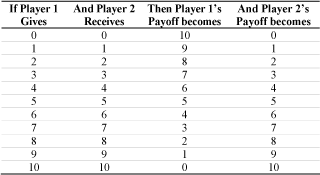|
|
|
Since the ultimatum game, a simple two-person bargaining environment is a foundation of other, more complicated bargaining environments, it is useful to explore and understand the motives hidden behind actions of players. Further information about the behavior of players could be revealed with the use of a dictator control (or a dictator game).
|
|
In the context of the ultimatum game the dictator control treatment is a control for the first mover's expectations of rejection by the second mover.
|
- There are two players participating in the game.
- Player 1 proposes a split of $10.
- Player 2 has no decision to make.
- The split is implemented as the final payoff
|

|
|
Monetary payoff maximizing player 1 does not have to worry whether player 2 will accept or reject the proposal since the latter has no decision to make and thus player 1 will propose a split of $10 for himself and $0 for player 2.
|
|
In the Hoffman, McCabe, Shachat, and Smith [1994] paper the authors observe that under the double blind payoff protocol, when no one including other subjects, experimenters or any outside observer could possibly learn any individual's behavior in the experiment, 64% of the offers in the dictator game were $0, with only 8% offering $4 or more.
|
|
The compelling explanation of non-selfish behavior of player 1 in the dictator game, i.e. proposing a positive amount to player 2, is the player's altruistic other-regarding preferences.
|
|
When comparing the proposals made by player 1 in the dictator game and in the ultimatum game, one can find out how much of the money in the ultimatum game was proposed to player 2 because of altruism and how much because of fear of rejecting the proposed split by player 2.
|
|
The idea of separating motives of behavior is further examined in investment and moonlighting game dictator controls.
|
|
For a computerized version of the Ultimatum Game Dictator Control, go to Charles Holt's :
Ultimatum/Dictator Bargaining Game software
|
- Fosythe, Robert, Joel Horowitz, N. E. Savin, and Martin Sefton, "Replicability, Fairness and Pay in Experiments with Simple Bargaining Games," Games and Economic Behavior, May 1994, 6(3), pp. 347-69.
- Hoffman, Elizabeth, Kevin McCabe, Keith Shachat, and Vernon L. Smith, "Preferences, Property Rights, and Anonymity in Bargaining Games," Games and Economic Behavior, 7:3 (November 1994), pp. 346-380.
- Hoffman, Elizabeth, Kevin McCabe, and Vernon Smith, "Social Distance and Other-Regarding Behavior in Dictator Games." American Economic Review, 3, 1996, pp. 653-660.
|
| |